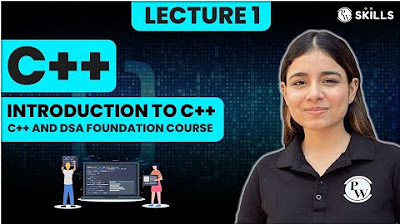[Arabic] Fundamentals Of Programming With C++ #005 - How The C++ Works
Summary
TLDRIn this introductory C++ programming tutorial, the instructor explains the basics of C++ with a focus on foundational concepts. Emphasizing simplicity, the video covers key topics like preprocessing, libraries (such as `#include <iostream>`), and the role of the `main()` function. The instructor advises against diving too deeply into advanced topics early on and stresses the importance of understanding core principles first. With a casual and friendly tone, the video encourages beginners to learn step-by-step, offering valuable insights into program flow, data types, and the significance of returning values from functions.
Takeaways
- 😀 The speaker emphasizes teaching the basics of C++ programming without delving into complex or advanced topics.
- 😀 The preprocessor (`#include`) is explained as a way to include libraries that provide essential functions, such as input/output operations.
- 😀 The main function (`int main()`) is the entry point of every C++ program, where the program execution starts.
- 😀 Returning a value (like `return 0;`) from the main function signals the successful completion of the program.
- 😀 The process of program execution in C++ occurs line by line, and controlling the flow of execution will be explored in later lessons.
- 😀 Libraries in C++ are used to import predefined functions, like `cout` for output and `cin` for input, which simplifies coding.
- 😀 The `#include <iostream>` directive brings in the input-output stream functions needed for displaying output on the console.
- 😀 The speaker advises that understanding these basic concepts is critical before diving into more advanced aspects of C++ programming.
- 😀 The return type `int` in the main function specifies that the program will return an integer to the operating system when it finishes.
- 😀 A key takeaway is the understanding of the preprocessing step that occurs before the main code compilation, where external functions or files are included.
Q & A
What is the purpose of the video?
-The video aims to introduce the basics of C++ programming, explain the code in detail, and provide foundational knowledge that will be useful in the future.
What is the main objective behind teaching the basics of C++ in this video?
-The main objective is to ensure that learners understand the fundamentals of C++ programming, without delving into advanced or complicated topics that may complicate the learning process.
What are the three important points to agree on before proceeding with learning C++?
-1. Focus on the basics of programming rather than advanced C++ topics. 2. Some terms will be mentioned but explained in more detail later. 3. The concept of ready-made libraries, like the 'iostream' library, will be used and explained.
What does the 'include' directive do in C++?
-'#include' is used to include external libraries or files, such as 'iostream', into the code. This allows access to predefined functions, like 'cin' and 'cout', that are part of the included library.
Why is the 'iostream' library important in C++?
-'iostream' provides essential functions for input and output operations, such as 'cin' (input) and 'cout' (output). It simplifies interaction with the user and the system.
What is the role of the preprocessor in C++?
-The preprocessor handles certain instructions before the actual compilation of the code. This includes actions like including files, which are processed before the code is compiled into machine language.
What does the statement '#include <iostream>' do specifically in the code?
-'#include <iostream>' includes the 'iostream' library into the program, allowing the use of standard input and output functions, like 'cin' and 'cout'.
What is the significance of the 'return 0;' statement in C++?
-'return 0;' indicates the successful completion of the program. It is a convention in C++ that signals to the operating system that the program executed correctly.
What does 'main()' represent in a C++ program?
-'main()' is the entry point of a C++ program. It is the first function executed when the program runs. The program's instructions are processed starting from the 'main' function.
Why is it important to understand the data type returned by a function in C++?
-Understanding the return type of a function ensures the function's output is compatible with the expected data type. Incompatibility between return types and expected values can cause errors or undefined behavior.
Outlines

This section is available to paid users only. Please upgrade to access this part.
Upgrade NowMindmap

This section is available to paid users only. Please upgrade to access this part.
Upgrade NowKeywords

This section is available to paid users only. Please upgrade to access this part.
Upgrade NowHighlights

This section is available to paid users only. Please upgrade to access this part.
Upgrade NowTranscripts

This section is available to paid users only. Please upgrade to access this part.
Upgrade NowBrowse More Related Video

Cara Instalasi Dev Belajar Pemograman C++ | Informatika XI

C++ 13 | If Else | Tutorial Percabangan C++

Introduction to C++ | Lecture 1 | C++ and DSA Foundation Course

Part 1 Introduction || C#.Net Tutorials For Beginners & Experienced || @NehanthWorld

Introduction to C++ Programming

Pemrograman C [Dasar] - Pengenalan Pemrograman C dan Cara Kerjanya #1
5.0 / 5 (0 votes)